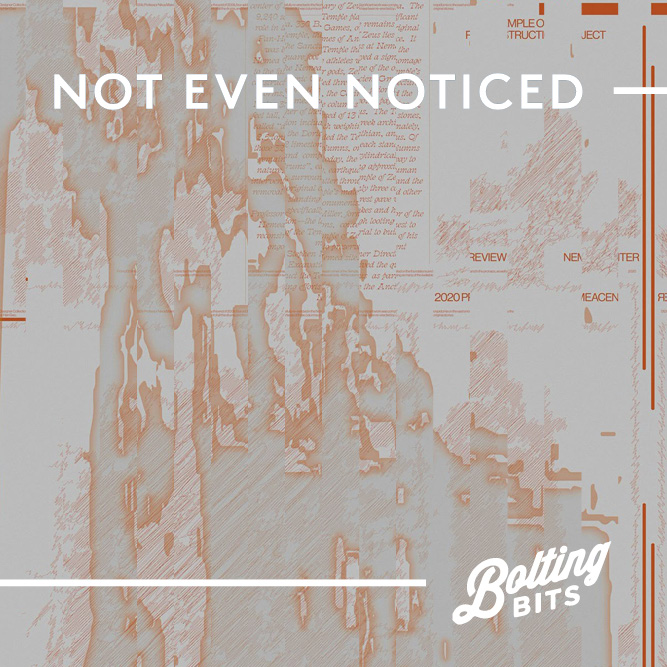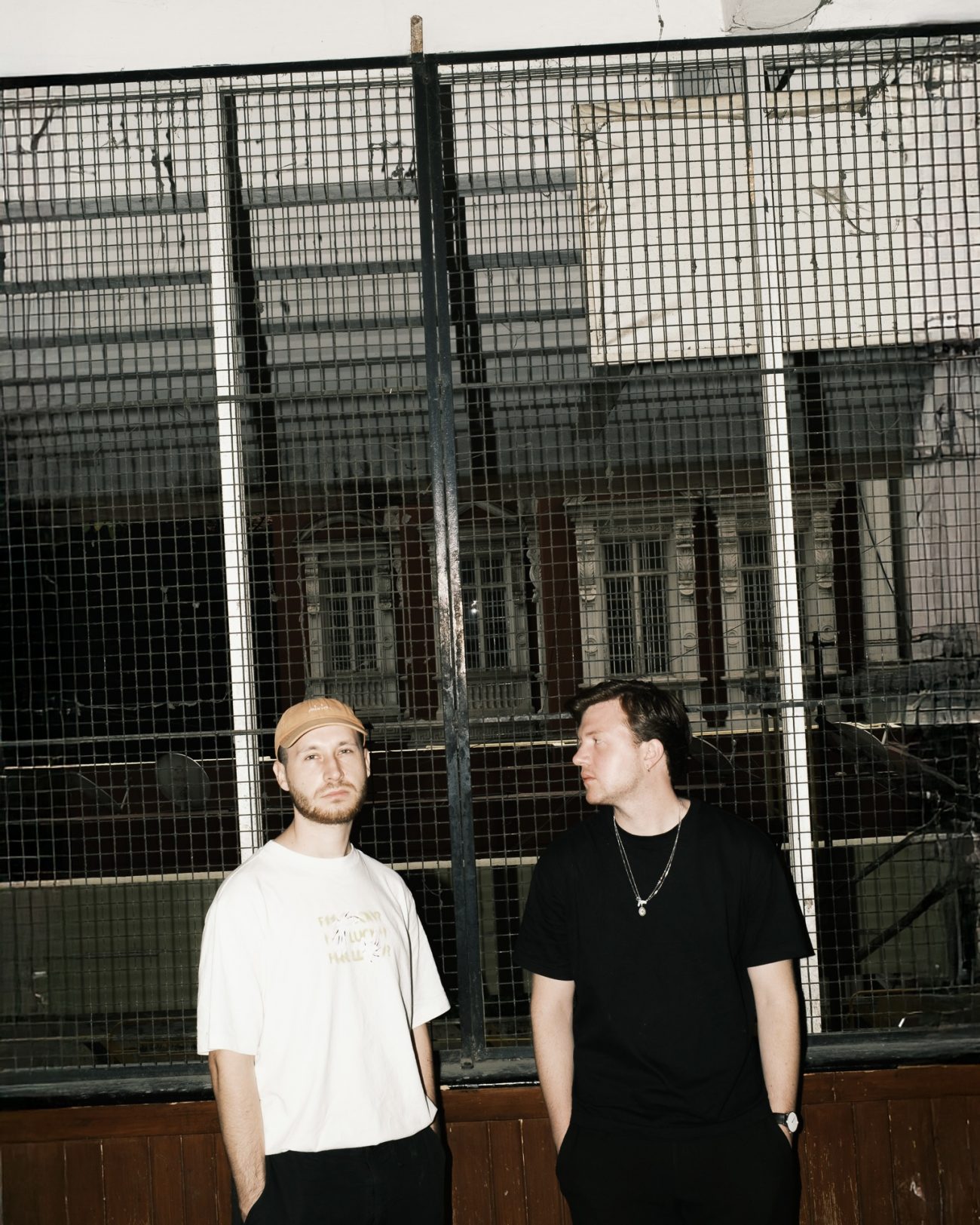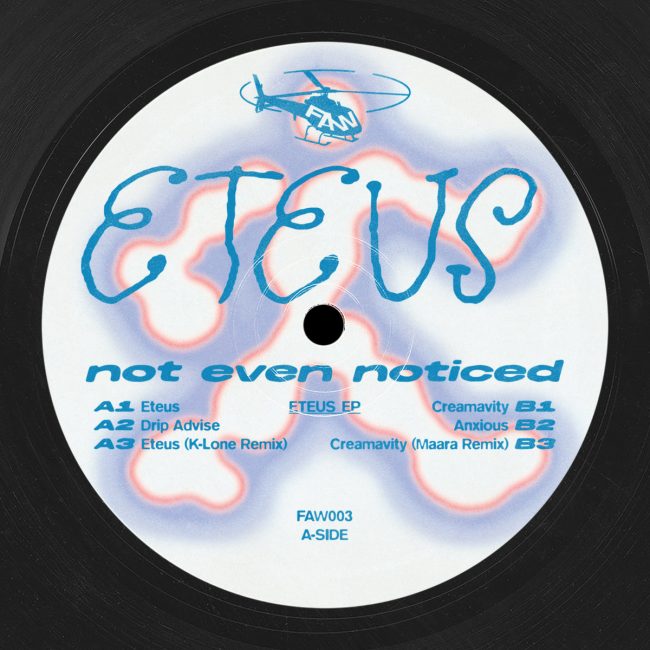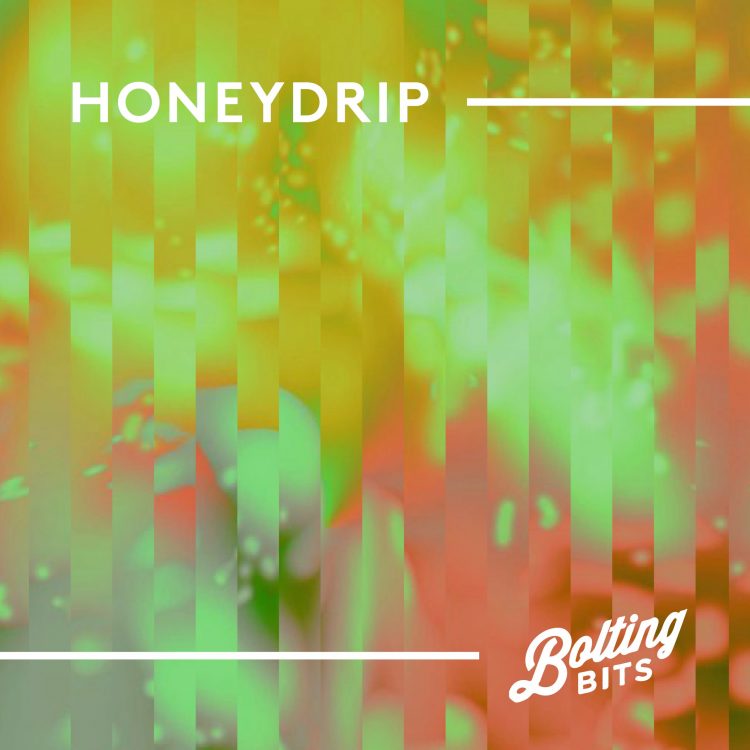
In a landscape saturated with maximalist gestures and instant gratification, Not Even Noticed operate in the periphery — a project whose very name speaks to its ethos. The Frankfurt–Leipzig duo have been quietly sculpting a sonic language of restraint and intention since emerging in the early 2020s, threading broken rhythms, trance-infused atmospheres, and acid-washed details into music that rewards patience and deep listening. Their productions don’t clamor for attention; they invite it, revealing hidden layers only to those willing to lean in.
Their latest chapter, the Eteus EP, released this summer on LA’s visionary Fast At Work imprint, is perhaps their most refined statement yet. Drawing on the myth of Eteus — a figure of light and knowledge — the record explores the delicate tension between weight and weightlessness, minimal form and maximal emotion. Across four originals and two masterful remixes from K-Lone and Maara, Not Even Noticed map a territory where low-swung basslines pulse like a heartbeat beneath vaporous melodies, and whispered vocals guide the listener toward ecstatic release. It’s a transmission you feel as much as you hear, a document of artists expanding their craft while remaining faithful to their understated pulse.
To accompany our conversation, the duo have prepared an exclusive mix for Bolting Bits’ MIXED BY series — a glimpse into their current orbit, stitched together with the same care and subtlety that defines their studio work. In the interview that follows, we dive into the mythic inspirations and meticulous processes behind Eteus, the evolution of their collaboration, and the philosophies driving one of electronic music’s most quietly compelling acts.
INTERVIEW

The Eteus EP is built around the figure of Eteus, described as a mythic god of light and knowledge. What drew you to that name and concept, and how did this narrative shape the emotional arc and sequencing of the record, from the opening track to the final moments of “Anxious”?
We usually decide on the track and EP titles at the final stage of the production process — the same goes for this project. Once we had the tracklist together for this EP, we felt a sort of transcendental vibe, which became the inspiration for the name.
The release is described as “minimal in message, maximal in emotion,” rewarding those who listen closely. How do you approach achieving that balance in your production process — stripping things back while still evoking something deeply human and intense? Are there specific elements you deliberately keep sparse so that others can resonate more strongly?
For us, it’s often the little imperfections that make the sound feel human. We like to work with field recordings, real-world samples, and even subtle glitches, elements that bring a sense of texture and unpredictability. Those details might seem minimal, but they carry emotion and depth, giving the music a more organic and intimate character. At the same time, we always try to bring a certain tonality through melodies and atmospheric layers, aiming to find a balance between club-oriented energy and more introspective, listening-focused music.
Tracks like “Eteus,” “Drip Advise,” and “Creamavity” are rich with low-swung basslines, siren-like motifs, shimmering arpeggios, and acid textures. Can you walk us through some of the sound design decisions behind those details — the synths, effects, or processing techniques that help create that glowing, textural world?
Acid has always played a big role in our productions — it’s such a versatile sound with a strong sense of identity. There are very few sounds that can work so well across different settings while still remaining instantly recognizable. On this project, we focused a lot on call-and-response motifs and recurring sonic gestures to keep a sense of liveliness and modulation throughout, without drifting too far from the meditative core of the tracks.
Your music often exists in a space between broken rhythms, trance-inspired euphoria, and acid-driven propulsion. When you’re starting a track, how do you decide on its rhythmic direction and tempo? Does it come from the groove itself, a melodic idea, or a particular feeling you want to create on the dancefloor?
Usually one of us comes in with an idea or a direction in mind, sometimes already prepared, sometimes just described in a few words. By now, after working together for so long, we don’t need much explanation to understand where the other wants to go. The rhythm often evolves during the process, but the initial groove or feeling tends to stay as the foundation.
The final track, “Anxious,” features a vocal that repeats the phrase “release yourself, into the unknown.” How do you think about the role of vocals in your work — are they meant as lyrical statements, textural elements, or something more ritualistic? And what does that particular line mean in the context of the EP’s overall narrative?
Vocals are an important element for us, they help create tension and bring that human presence into the music. Sometimes they act almost like another instrument, shaping the atmosphere and emotional contour of a track. Anxious actually existed before the rest of the EP, and we didn’t adapt it to fit the concept afterwards. But that’s what makes it so interesting — it naturally resonated with the themes we were exploring. The line “release yourself, into the unknown” captures that feeling of surrender and uncertainty that runs through the whole record, both musically and emotionally.

Eteus – not even noticed on Fast At Work
The record also features two striking remixes by K-Lone and Maara, each taking the material in a completely different direction. How did those collaborations come about, and how much freedom did you give them in reinterpreting your work? Were there any surprises when you first heard their versions?
Both remixes were initiated by Fast at Work after we had some longer conversations about which artists would really fit the EP. When we got the confirmations, we were honestly super happy as we’re big fans of both K-Lone and Maara. We gave them complete freedom, partly because we don’t really believe in setting creative boundaries, and partly because we knew something special would come from both of them. We were especially surprised by Maara’s approach — she turned her remix into a 10-minute spiritual trip that perfectly captures the essence and atmosphere of the EP.
Fast At Work has carved out a distinctive space with its releases, and Eteus feels very aligned with the label’s vision. What made this imprint the right home for the record, and how did working with them influence aspects like the tracklist, artwork, or overall presentation?
Working with Fast at Work was really inspiring. They have a clear sense of their label’s identity and storyline, but at the same time they gave us all the freedom to contribute and shape things together. When it came to the artwork and presentation, there wasn’t much we had to discuss as it was obvious early on that they understood our vision and could bring it to life. They’ve got experience from all kinds of corners of the music world, and you can really feel that in the way they know how to put a project like this out there.
As a duo, your collaboration seems to rely on a shared sense of subtlety and restraint. How do you divide creative responsibilities in the studio — do you each focus on particular aspects of the process, or is everything more fluid and collaborative? And how has your workflow evolved over time as you’ve grown together artistically?
We’ve been working together for a long time and have been best friends ever since, so by now we’ve developed a pretty intuitive sense of what feels right and what doesn’t. At the start of a production, our roles are usually a bit more divided — Carsten focuses more on the groove, while Lucas works on the atmospheric layers and melodies. After a while, we bring everything together, refine it, and decide which direction we want to follow. That part always happens collaboratively. Other aspects of the project are also split between us, which gives each of us time to focus on certain things and trust the other person in their area. Since we live in different cities, a lot of the process happens remotely and that’s the only way to make it work.
You’ve also prepared an exclusive mix to accompany this interview. What was your intention behind it — did you see it as a snapshot of your current DJ sets, a chance to experiment with deeper or more abstract sounds, or a continuation of the ideas you explored on the EP?
We just finished our tour, which gave us a lot of opportunities to experiment and evolve our sound as DJs. The mix includes many of the tracks that have been on heavy rotation for us lately, but it also explores some new directions, for example, touches of dubstep influences that we don’t usually play that often.
The visual world around Eteus — from the artwork to the overall aesthetic — feels like an extension of the record’s mood. How important is visual identity to your project, and how involved are you in translating musical ideas into imagery? Do you collaborate closely with designers, or is it something you develop yourselves?
Visual identity has always been important to us, but it’s only recently that we’ve started giving it the attention it really deserves. We work closely with our friend and designer Johannes Kompa, who has a great sense for connecting visual identity and sound, and helps us evolve our ideas further. Beyond that, it’s just as important for us as in the music itself to express what we genuinely feel, it has to stay authentic.
With Eteus marking a significant step forward in your sound, where do you see the project heading next? Are you interested in pushing further into ambient territory, exploring faster tempos, or experimenting with entirely new structures? And are there any dream collaborations or formats you haven’t yet explored but would like to?
Right now, we’re involved in several exciting projects and collaborations that we can’t reveal too much about just yet. What matters most to us is continuing to evolve the project in all its facets – exploring new sonic directions, experimenting with different structures, and staying open to whatever feels genuine and inspiring. We want to keep pushing forward without losing what defines our core. The months ahead are going to be exciting, and we’re really looking forward to what’s next.
Order now Eteus on Fast At Work.



